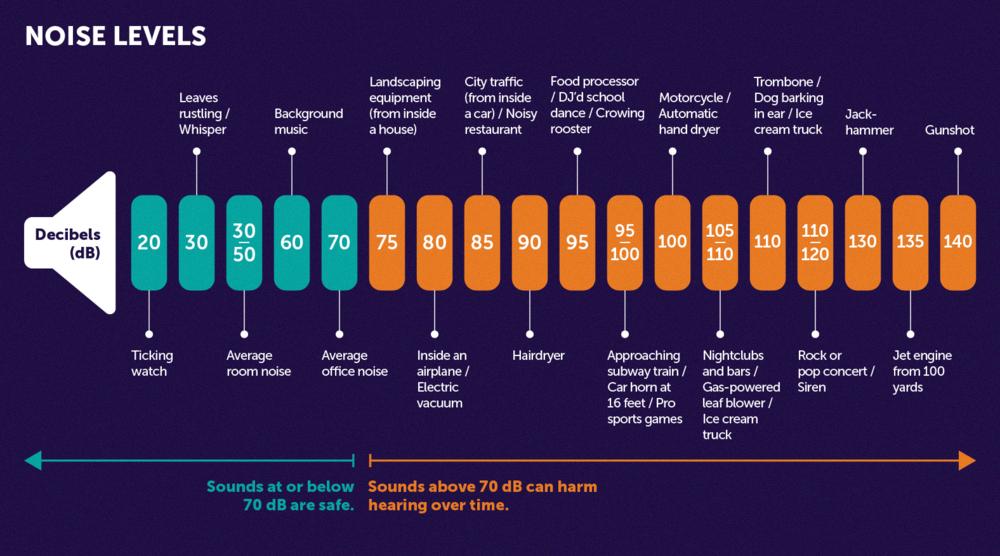When it comes to measuring sound, decibels (dB) are the unit of measurement used. To put it into perspective, a whisper is about 30 dB, whle normal conversation is about 60 dB. A motorcycle engine running is about 95 dB. Anything above 70 dB over a prolonged period of time may start to damage hearing, while noise above 120 dB can cause immediate harm to ears.
So, how loud is 50 dB? To begin with, it’s important to note that 50 dB is comparable to a quiet home environment, a residential street, or a normal conversation between two people. It’s also important to keep in mind that any noise level above 50 dB can be disruptive, especially when trying to sleep or concentrate.
For example, a quiet dishwasher can have a decibel level as low as 38 dBA, but any dishwasher with a decibel level of 44 dBA or lower may be considered quiet. A decibel level of 50 dBA or above tends to be thought of as average. Older dishwashers may have a 60 dBA, which is double the noise of 50 dBA.
When it comes to other common noises, 50 dB is comparable to the sound of a refrigerator humming or a light rain shower. It’s also around the noise level of a library or a soft conversation in a quiet room.
While 50 dB may not seem very loud, it’s important to keep in mind that any noise level can be disruptive in certain situations. Whether it’s trying to sleep, work, or concentrate, it’s important to be mindful of noise levels and take steps to minimize them when possible.
Is 50 Decibels Too Loud?
The answer to whether 50 dB is too loud depends on the context. In general, 50 dB is considered a moderate level of sound that is equivalent to the sound of a quiet conversation or background music. It is unlikely to case immediate harm to your ears, but prolonged exposure to this level of sound may still cause damage over time.
According to the Occupational Safety and Health Administration (OSHA), exposure to noise levels of 85 dB or higher for more than eight hours a day can lead to hearing loss. However, the duration of exposure also plays a role in determining the potential harm to your hearing. For example, exposure to 110 dB for more than one minute can cause immediate damage, while exposure to the same level for just a few seconds may not cause harm.
It is important to note that the effects of noise exposure are cumulative, meaning that even exposure to moderate levels of sound over a prolonged period of time can cause hearing damage. Therefore, it is recommended to take precautions such as wearing earplugs or earmuffs in noisy environments, and limiting exposure to loud sounds whenever possible.
50 dB is not considered too loud in most situations, but prolonged exposure to this level of sound may still cause hearing damage over time. It is important to take precautions to protect your hearing in noisy environments and limit exposure to loud sounds whenever possible.

Source: hearinghealthfoundation.org
Can You Sleep Comfortably With 50 Decibels?
The answer to whther you can sleep with 50 decibels is that it depends on the individual’s tolerance to sound. 50 decibels is considered a low level of noise and is comparable to a quiet conversation or the hum of a refrigerator. For most people, this level of noise is not disruptive and they can fall asleep without any issues.
However, there are some individuals who are more sensitive to noise and may find it difficult to fall asleep with any level of noise in the background. In such cases, they may require complete silence or white noise to fall asleep.
It is worth noting that the type of sound can also impact an individual’s ability to sleep. For example, sudden or intermittent sounds like a car honking or a dog barking can be more disruptive than a constant and predictable noise like a fan or air conditioner.
Whether or not an individual can sleep with 50 decibels depends on their personal tolerance to noise. While it is generally considered a low level of noise, some individuals may require complete silence or white noise to fall asleep.
Is 50 Decibels Loud for a Dishwasher?
When it comes to determining whether a dishwasher is loud, one of the most important factors to consider is its decibel level. Decibels (dB) are used to measure the loudness of sound, and the lower the decibel level, the quieter the sound.
So, is 50 dB loud for a dishwasher? The answer is no, it is not considered loud. In fact, a dishwasher with a decibel level of 50 dB is considered average in terms of noise level.
To put this into perspective, a quiet dishwasher may have a decibel level as low as 38 dB, while an older dishwasher may have a decibel level of 60 dB or higher.
To help you better understand what diferent decibel levels sound like, here is a quick breakdown:
– 0 dB: The threshold of hearing
– 20 dB: Whispering
– 40 dB: Quiet library or bird calls
– 50 dB: Average dishwasher noise level or moderate rainfall
– 60 dB: Normal conversation or a busy restaurant
– 70 dB: Vacuum cleaner or heavy traffic
– 80 dB: Garbage disposal or alarm clock
– 90 dB: Lawnmower or subway train
– 100 dB: Chainsaw or rock concert
– 120 dB: Jet engine or thunderclap
A dishwasher with a noise level of 50 dB is not loud and is considered average in terms of noise level. However, if you are looking for a quieter dishwasher, you may want to consider one with a decibel level of 44 dB or lower.
Noise Level of 55 Decibels
When it comes to measuring sound, decibels (dB) are the unit of measurement used. 55 dB is considered to be a moderate to soft level of sound. To put it into perspective, it is roughly equivalent to the sound level of a quiet home environment, a typical residential street, or a normal conversation between two people.
To understand how loud 55 dB really is, it may be helpful to compare it to other common sounds. For example:
– A refrigerator humming is typically around 40-50 dB
– A normal conversation is around 60 dB
– A library or quiet office is typically around 40 dB
It’s also worth noting that exposure to sound levels above 85 dB for prolonged periods of time can lead to hearing damage, and that cetain sounds can be more harmful than others even if they are at the same dB level.
55 dB is considered to be a moderate to soft level of sound, and is comparable to a quiet home environment, a residential street, or a normal conversation between two people.

Conclusion
A decibel level of 50 dB is generally considered to be a low level of noise. It is comparable to a quiet home environment, a residential street, or a normal conversation between two people. This level of noise is generally not disruptive and can be easily tolerated by most people. However, it is important to note that prolonged exposure to noise aboe 70 dB may start to damage your hearing, and loud noise above 120 dB can cause immediate harm to your ears. Therefore, it is important to be mindful of the noise levels in your environment and take steps to protect your hearing when necessary. a decibel level of 50 dB is a relatively quiet level of noise and is generally considered to be a comfortable and peaceful environment to be in.
